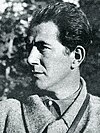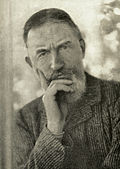| << | Today's featured articles for March 2017 | >> | ||||
|---|---|---|---|---|---|---|
| Su | Mo | Tu | We | Th | Fr | Sa |
| 1 | 2 | 3 | 4 | |||
| 5 | 6 | 7 | 8 | 9 | 10 | 11 |
| 12 | 13 | 14 | 15 | 16 | 17 | 18 |
| 19 | 20 | 21 | 22 | 23 | 24 | 25 |
| 26 | 27 | 28 | 29 | 30 | 31 | |
March 1

Viking metal is a style of heavy metal music characterized by a lyrical and thematic focus on Norse mythology, Norse paganism, and the Viking Age. It is a genre, or group of genres, often featuring slow-paced and heavy riffing, anthemic choruses, use of both sung and harsh vocals, inclusion of folk instrumentation, and frequent use of keyboards for atmospheric effect. It emerged during the late 1980s and early 1990s from black metal groups who were influenced by Nordic folk music. Artists such as Led Zeppelin, Yngwie Malmsteen, Heavy Load, and Manowar had used lyrics that invoked the Vikings, but Bathory from Sweden is generally credited with pioneering the style. Enslaved (pictured), from Norway, followed up Bathory's work with several Viking-themed albums released during the 1990s. Burzum, Emperor, Einherjer, and Helheim, among others, further developed the genre. As early as 1989 with Falkenbach from Germany, Viking metal began spreading outside the Nordic countries and across the globe. The death metal bands Unleashed and Amon Amarth also adopted Viking themes, broadening the style from its primarily black metal origin. (Full article...)
March 2
Burning Rangers is a 1998 3D action video game developed by Sonic Team and published by Sega for the Sega Saturn. The game is set in a futuristic society threatened by frequent fires. Players control one of an elite group of firefighters, the Burning Rangers, who extinguish the fires and rescue civilians from burning buildings. Most of the tasks the players complete are centred around collecting energy crystals used to transport civilians to safety. Development began shortly after the release of Christmas Nights in November 1996, when Yuji Naka started working on a game focused on saving people rather than killing them. Sonic Team chose the themes of firefighting and heroism. Burning Rangers received mostly positive reviews, especially for the game's soundtrack and audio. Responses to the graphics were mixed; while some critics asserted that the game had the best visuals on the Saturn, others faulted its poor collision detection and occasional glitching. The game was among the final five Saturn titles released in America. (Full article...)
March 3
Ian O'Brien (born 3 March 1947) is a former breaststroke swimmer for Australia who won the 200 metre breaststroke at the 1964 Summer Olympics in Tokyo in world record time. In 1962 at the age of 15 he competed in his first national championships, winning the 220 yard breaststroke. At the 1962 British Empire and Commonwealth Games in Perth, Western Australia, he won both the 110 and 220 yd breaststroke and the 4 × 110 yd medley relay. He won both breaststroke events at the 1963 Australian Championships, repeating the feat for the next three years. After winning his gold medal at the Tokyo Olympics, he added a bronze in the medley relay. O'Brien successfully defended both his breaststroke titles at the 1966 British Empire and Commonwealth Games in Kingston, Jamaica. He won five Commonwealth Games gold medals and claimed a total of nine individual and six relay titles at the Australian Championships. He retired from the sport at the age of 21, worked for 10 years as a television stagehand, and later launched a company that produced television documentaries. In 1986 he was inducted into the Sport Australia Hall of Fame. (Full article...)
March 4
Sabrina Sidney (1757–1843) was a British foundling girl taken in when she was 12 by the author Thomas Day, who wanted to mould her into his perfect wife. As an adult she worked with the schoolmaster Charles Burney, managing his schools. In 1769 Day took Sabrina to France to begin methods of education inspired by Rousseau's Emile, or On Education. When she reached her teenage years, Day's friend Richard Lovell Edgeworth persuaded him that his ideal-wife experiment had failed. In 1783 Sabrina was told the truth about Day's experiment and confronted him in a series of letters. In 1804, Anna Seward published a book about Sabrina's upbringing. In his 1820 memoirs, Edgeworth said that Sabrina and Day made a good match and that she loved him. Sabrina countered that Day had made her miserable, and that she had effectively been a slave. The story of Sabrina's life has been told in Wendy Moore's 2013 book How to Create the Perfect Wife and dramatised in the 2015 BBC Radio 4 play The Imperfect Education of Sabrina Sidney. (Full article...)
March 5
Myotis alcathoe, the Alcathoe bat, is a small European bat. First described in 2001 from specimens taken from Greece and Hungary, its known distribution has expanded to include parts of Western and Central Europe, Spain, Italy, the Balkans, Sweden, and Azerbaijan. It is similar to the whiskered bat (M. mystacinus), but its brown fur is distinctive, and DNA sequencing has shown it to be a separate species. M. alcathoe has a forearm length of 30.8 to 34.6 mm (1.21 to 1.36 in) and a body mass of 3.5 to 5.5 g (0.12 to 0.19 oz). The fur is brown on the wings, usually reddish-brown on the upperparts, and brown below, but more grayish in juveniles. It has a very high-pitched echolocation call, with a frequency that falls from 120 kHz to about 43 kHz at the end of the call. Usually found in old-growth deciduous forest near water, it forages high in the canopy and above water, mostly for flies. It roosts in cavities high in trees. The species is considered at risk in Catalonia, Germany and parts of Switzerland due to its rarity and vulnerability to habitat loss. (Full article...)
March 6
"Death on the Rock" is a 1988 British television documentary that was produced by Thames Television as part of the current affairs series This Week on ITV. It examined the shooting deaths of three Provisional Irish Republican Army (IRA) members by the British Special Air Service in Gibraltar on 6 March 1988. The series' editor, Roger Bolton, had dispatched journalists to Gibraltar and Spain to interview witnesses to the shootings and Spanish police officers who had surveilled the IRA team. The documentary presented evidence that the team were unarmed, and were shot without warning or while attempting to surrender. The British government denounced the programme, and Geoffrey Howe, the foreign secretary, tried to get the broadcast postponed by the Independent Broadcasting Authority. An independent inquiry, the Windlesham–Rampton report, found that the documentary was made in "good faith and without ulterior motives". It was praised within the television industry and won that year's BAFTA Award for Best Documentary. (Full article...)
March 7
SMS Nassau was the first dreadnought battleship built for the Imperial German Navy, in response to the launching of the British battleship HMS Dreadnought. Nassau was laid down in 1907 at the Imperial Shipyard in Wilhelmshaven and launched on 7 March 1908. Three more battleships followed in the same class: Posen, Rheinland, and Westfalen. Assigned to the First Battle Squadron of the German High Seas Fleet, Nassau saw service in the North Sea in the beginning of World War I. In August 1915 the ship engaged the Russian battleship Slava in the Battle of the Gulf of Riga in the eastern Baltic Sea. Nassau took part in the Battle of Jutland on 31 May and 1 June 1916, suffering a total of 11 killed and 16 injured. After World War I, the bulk of the High Seas Fleet was interned in Scapa Flow, but the Nassau-class ships, the oldest German dreadnoughts, were initially permitted to remain in German ports. After the German fleet was scuttled, Nassau and her sister ships were surrendered to the victorious powers as replacements for the sunken ships. Nassau was ceded to Japan, then sold to a British wrecking firm for scrapping. (Full article...)
Part of the Battleships of Germany featured topic.
March 8
Bessie Braddock (1899–1970) was a British Labour Party politician who served as Member of Parliament (MP) for the Liverpool Exchange division from 1945 to 1970. She was a member of Liverpool County Borough Council from 1930 to 1961. Although she never held office in government, she won a national reputation for her campaigns in connection with housing, public health and other social issues. Braddock supported the 1945–51 Attlee ministry's reform agenda, particularly the establishment of the National Health Service in 1948. She served on Labour's National Executive Committee between 1947 and 1969. For most of her parliamentary career she was a member of Liverpool's council, and was a central figure in a controversy in the 1950s over the city's flooding of the Tryweryn Valley to construct a reservoir. When Labour won the 1964 general election she refused office on the grounds of age and health; thereafter her parliamentary contributions dwindled as her health worsened. Towards the end of her life she became Liverpool's first woman freeman. Her Guardian obituarist hailed her as "one of the most distinctive political personalities of the century". (Full article...)
March 9
"Mothers of the Disappeared" is a song by the rock band U2, the closing track on their album The Joshua Tree, released on 9 March 1987. The song was inspired by lead singer Bono's experiences in Nicaragua and El Salvador in July 1986, following U2's involvement on Amnesty International's A Conspiracy of Hope tour. He learned of the Madres de Plaza de Mayo, a group of women whose children had been abducted with the consent of Argentine and Chilean dictatorships. Thematically the song has been interpreted as an examination of failures and contradictions in US foreign policy and as a criticism of the Reagan Administration, which backed two South American regimes that seized power during coups and which provided financial support for the military regime in El Salvador. The song was favourably received by critics, and has been performed live on several tours, starting with the 1987 Joshua Tree Tour. It was played at four concerts on the 1998 PopMart Tour in South America; during two of these, the Madres joined the band onstage (pictured). (Full article...)
March 10
The mangrove swallow (Tachycineta albilinea) is a bird in the swallow family that breeds in coastal regions of Mexico and Central America. It is a seasonal breeder and is territorial when breeding, much like the related tree swallow. Its nests are frequently found near water, no more than 2 metres (7 ft) above the ground. It usually forages close to the nest when feeding its chicks, but will go much further when foraging for itself. In between foraging attempts, it perches near water. It subsists primarily on a diet of flying insects, including dragonflies and bees, unusually large prey for a bird of its size. It has blue-green upperparts, white underparts, a white streak above the eye, and blackish flight and tail feathers. This swallow's song is a soft trilling, with a rolled jeerrt call, and a sharp alarm note. With a slowly decreasing population of at least 500,000 individuals, the mangrove swallow is classified as a species of least concern by the International Union for Conservation of Nature. (Full article...)
March 11
Negotiations between German commanders and the Yugoslav Partisans commenced on 11 March 1943 during an Axis offensive in World War II. Focused on obtaining a ceasefire and establishing a prisoner exchange, the talks were also used to delay the Axis forces while the Partisans crossed the Neretva river and began attacking their Chetnik rivals, led by Draža Mihailović. The talks were accompanied by an informal ceasefire that lasted about six weeks before being called off by Adolf Hitler. The advantage gained by the Partisans was lost when another Axis offensive was launched in mid-May 1943. Some parts of the negotiations were published from 1949 onwards, but many details were little known by historians until the 1970s, including the identity of the chief Partisan negotiator, Milovan Đilas (pictured). The US diplomat Walter Roberts published a description of the talks in 1973 in a well-received book that was protested by the Yugoslav government of Josip Broz Tito for its depiction of the Partisans. Beginning in the 1980s, accounts of the negotiations were published by Yugoslav historians and the main Yugoslav protagonists. (Full article...)
March 12
Eta Carinae is a stellar system of at least two stars with a combined luminosity over five million times that of the Sun, around 7500 light-years distant in the constellation Carina. First recorded as a 4th-magnitude star, it brightened considerably beginning in 1837 in an event known as the Great Eruption, becoming the second-brightest star in the sky between 11 and 14 March 1843 before fading well below naked eye visibility. It has been getting brighter again since about 1940, peaking above magnitude 4.5 in 2014. Eta Carinae is always above the horizon south of latitude 30°S, and never visible north of about latitude 30°N. The two main stars of the system orbit each other with a period of 5.54 years. The primary is a peculiar star similar to a luminous blue variable, initially 150–250 times as massive as the Sun but now at least 30 solar masses lighter, and is expected to eventually explode as a supernova. The secondary star is hot and also highly luminous, around 30–80 times as massive as the Sun. The system is heavily obscured by the Homunculus Nebula, material ejected from the primary during the Great Eruption. (Full article...)
March 13
God of War II is a third person action-adventure video game first released on March 13, 2007, and was the last major release for the PlayStation 2. The player controls Kratos, a Spartan warrior who became the new God of War after killing the former, Ares. Kratos is betrayed by Zeus, the King of the Olympian Gods, who strips him of his godhood and kills him. On his way to the Underworld, Kratos is saved by Gaia, who instructs him to find the Sisters of Fate. Acquiring their power, he travels back in time to avert his betrayal and take revenge on Zeus, who is revealed to be his father. The gameplay focuses on combo-based combat and features quick time events that require the player to complete game controller actions in a timed sequence to defeat stronger enemies and bosses. The game also features magical attacks, puzzles, and platforming elements. The fourteenth best-selling PlayStation 2 game of all time, it sold more than 4.24 million copies worldwide. Regarded as one of the best action-adventure games for the platform and noted for its graphics and gameplay, it received several awards, including PlayStation Game of the Year. (Full article...)
Part of the God of War franchise featured topic.
March 14
Hugh de Neville (died 1234) was the Chief Forester under the kings Richard I, John, and Henry III of England, and a sheriff of several counties over his lifetime. Neville was related to royal officials and a bishop, and was a member of Prince Richard's household. After Richard became king in 1189, Neville continued in his service, accompanying him on the Third Crusade. Neville remained in the royal service following Richard's death in 1199 and the accession of King John to the throne, becoming one of the new king's favourites and often gambling with him. He was named in Magna Carta as one of John's principal advisers, considered by a medieval chronicler to be one of King John's "evil counsellors". He deserted John after the French invasion of England in 1216, but returned to pledge his loyalty to John's son Henry III after the latter's accession to the throne that year. Neville's royal service continued until his death in 1234, though by then he was a less significant figure than he had been at the height of his powers. (Full article...)
March 15
Allah jang Palsoe (Malay for The False God) is a 1919 stage drama from the Dutch East Indies that was written by the ethnic Chinese author Kwee Tek Hoay, based on E. Phillips Oppenheim's short story "The False Gods". Over six acts, the Malay-language play follows two brothers, one a devout son who holds firmly to his morals and personal honour, the other a man who worships money and prioritises personal gain. The two learn over the course of a decade that money (the titular false god) is not the path to happiness. Kwee Tek Hoay's first stage play, Allah jang Palsoe was written as a realist response to whimsical contemporary theatre. Though the published stageplay sold poorly and the play was deemed difficult to perform, Allah jang Palsoe found success on the stage. By 1930 it had been performed by various ethnic Chinese troupes to popular acclaim, and had pioneered a body of work by authors such as Lauw Giok Lan, Tio Ie Soei, and Tjoa Tjien Mo. In 2006 the script for the play, which continues to be performed, was republished with updated spelling by the Lontar Foundation. (Full article...)
March 16
Powderfinger, an Australian rock band, formed in Brisbane in 1989. From 1992 to 2010 the lineup consisted of vocalist Bernard Fanning, guitarists Darren Middleton and Ian Haug, bass guitarist John Collins and drummer Jon Coghill. The group's third studio album, Internationalist, peaked at No. 1 on the ARIA Albums Chart in September 1998. Their next studio album, Odyssey Number Five, reached number one in September 2000 and was certified eight times platinum, shipping over 560,000 units. Their next three studio albums also reached number one: Vulture Street (July 2003), Dream Days at the Hotel Existence (June 2007) and Golden Rule (November 2009). Powderfinger earned the third-highest total of ARIA Awards (18), after Silverchair and John Farnham. Their last tour, the Sunsets Farewell Tour, concluded on 13 November 2010. In November the following year, the band published a biography with Dino Scatena, a rock music journalist, called Footprints: the inside story of Australia's best loved band. (Full article...)
March 17
George Bernard Shaw (1856–1950) was an Irish playwright and critic who had a major influence on Western theatre, culture and politics. He was born in Dublin and moved to London in 1876 as a struggling writer and novelist. His first stage success was Arms and the Man in 1894; under the influence of Henrik Ibsen he brought a new realism into English-language drama, using his plays as vehicles to disseminate his often contentious political, social and religious ideas. He became a member of the gradualist Fabian Society, was a socialist pamphleteer and polemicist for over 50 years, and was instrumental in the foundation of the modern Labour Party. Many of his plays were critical and commercial successes, including Caesar and Cleopatra (1898), Man and Superman (1903), Major Barbara (1905), The Doctor's Dilemma (1906), Pygmalion (1913) and Saint Joan (1923). He was regarded as the leading dramatist of his generation, and was awarded the 1925 Nobel Prize in Literature. He wrote prolifically until shortly before his death, aged 94. (Full article...)
March 18
The Rosetta Stone is a large black stone stele bearing a translation of Ancient Egyptian text, the first recovered in modern times. Found in 1799, it is inscribed with three versions of a decree from 196 BC announcing the rule of King Ptolemy V. The texts are in Ancient Egyptian using hieroglyphic script and Demotic script and in Ancient Greek. The stone proved to be the key to deciphering Egyptian hieroglyphs. It was taken from building material in Fort Julien near the town of Rashid (Rosetta) in the Nile Delta when it was rediscovered during the Napoleonic campaign in Egypt. After British troops defeated the French in Egypt in 1801, they seized the stone and transported it to London. It has been on public display at the British Museum since 1802, and is the museum's most-visited object. Since its rediscovery, the stone has been the focus of nationalist rivalries, including a long-running dispute over the relative value of Thomas Young's and Jean-François Champollion's contributions to the decipherment, and demands this century for the stone's return to Egypt. (Full article...)
March 19
The Seri Rambai is a 17th-century Dutch cannon displayed at Fort Cornwallis in George Town, a UNESCO World Heritage Site city and capital of the Malaysian state of Penang. It is a fertility symbol, the subject of legends and prophecy, and the largest bronze gun in Malaysia. The cannon's history in the Malacca Straits began in the early 1600s when Dutch East India Company officers gave it to the Sultan of Johor in return for trading concessions. Less than a decade later, after Johor was destroyed and the sultan captured, the Seri Rambai was taken to Aceh. Near the end of the eighteenth century the cannon was sent to Selangor and mounted next to one of the town's hilltop forts. In 1871 pirates seized a Penang junk, murdered its passengers and crew, and took the stolen vessel to Selangor. The British colonial government responded by burning the town, destroying its forts and confiscating the Seri Rambai. Originally displayed on Penang's Esplanade, the gun was moved in the 1950s to the ramparts at Fort Cornwallis. (Full article...)
March 20
The Elder Scrolls IV: Oblivion is an action role-playing video game developed by Bethesda Game Studios and published by Bethesda Softworks and the Take-Two Interactive division 2K Games. Oblivion was released on March 20, 2006, for Microsoft Windows and Xbox 360, and later for mobile phones and PlayStation 3. In the main storyline, the player character thwarts the fanatical Mythic Dawn cult from opening the gates to a realm called Oblivion. The player can travel anywhere in the game world at any time, develop the character's skills, and ignore or postpone the main storyline indefinitely. The graphics were designed with an improved Havok physics engine, high dynamic range lighting, and procedural content generation tools to generate terrain. The Radiant A.I. system manages the complex behaviors of the non-player characters (NPCs). The game features the music of award-winning composer Jeremy Soule. Overall, Oblivion has been successful both commercially and critically, winning industry and publication awards. It was praised for its graphics, expansive game world, and fully voiced, schedule-driven NPCs. (Full article...)
Part of the The Elder Scrolls IV: Oblivion featured topic.
March 21
Neal Dow (March 20, 1804 – October 2, 1897) was an American prohibition advocate and politician. He was elected president of the Maine Temperance Union in 1850, and mayor of Portland the next year. Soon after, largely due to his efforts, the state legislature banned the sale and production of alcohol in what became known as the Maine Law. As mayor, Dow enforced the law with vigor and called for increasingly harsh penalties for violators. In 1855, his opponents rioted and he ordered the state militia to fire on the crowd. One man was killed and several were wounded. After public reaction to the violence turned against him, he chose not to run again for mayor. He was later elected to two terms in the state legislature, but retired after a financial scandal. He joined the Union Army shortly after the outbreak of the American Civil War in 1861 and became a brigadier general. He was wounded at the siege of Port Hudson and later captured. After being exchanged for another officer in 1864, Dow resigned from the military and devoted himself once more to prohibition. In 1880, he headed the Prohibition Party ticket for President of the United States. (Full article...)
Part of the United States presidential election, 1880 featured topic.
March 22
SMS Kaiser was the lead ship of her class of battleships of the Imperial German Navy. The ship was built by the Imperial Dockyard at Kiel, launched on 22 March 1911, and commissioned in August 1912 with ten 30.5-centimeter (12.0 in) guns and a top speed of 23.4 knots (43.3 km/h; 26.9 mph). Kaiser was assigned to the Third Squadron of the High Seas Fleet for the majority of World War I. The ship participated in most of the major fleet operations of the war, including the Battle of Jutland on 31 May – 1 June 1916, where she was hit once, suffering negligible damage. The ship was also present during Operation Albion in the Baltic Sea in September and October 1917, and at the Second Battle of Heligoland Bight in November 1917. After the war she was interned with other ships of the High Seas Fleet at Scapa Flow in Scotland. In June 1919 the commander of the interned fleet, Rear Admiral Ludwig von Reuter, ordered the fleet to be scuttled to ensure that the British would not be able to seize the ships. Kaiser's wreck was raised in 1929 and broken up in Rosyth in 1930. (Full article...)
Part of the Battleships of Germany featured topic.
March 23
The Oran fatwa was an Islamic legal opinion issued in 1504 to address the forced conversion to Christianity of Muslims in the Crown of Castile in Iberia in 1500–1502. The fatwa sets out detailed relaxations of the sharia (Islamic law) requirements, allowing the Muslims to conform outwardly to Christianity and perform acts that are ordinarily forbidden in Islamic law, when necessary to survive. It includes relaxed instructions to fulfill the ritual prayers, charity and purification, and recommendations for how to handle obligations that violated Islamic law, such as worshipping as Christians, performing blasphemy, and consuming pork and wine. The fatwa enjoyed wide currency in Spain among Muslims and Moriscos – Muslims nominally converted to Christianity and their descendants – from the time of the first forced conversions up to the expulsion of the Moriscos (1609–1614). The author of the fatwa was Ahmad ibn Abi Jum'ah, a North African Islamic law scholar (mufti) of the Maliki school. (Full article...)
March 24
The Piano Concerto No. 24 in C minor, K. 491, is a concerto by Wolfgang Amadeus Mozart for keyboard (period fortepiano pictured) and orchestra. He composed it in the winter of 1785–86 and completed it on 24 March 1786. He played the solo part in the premiere in early April that year at the Burgtheater in Vienna. The work is one of only two minor-key piano concertos by Mozart, the other being No. 20 in D Minor. It features the largest array of instruments of any Mozart concerto: strings, woodwinds including oboes and clarinets, horns, trumpets and timpani. The concerto consists of three movements. The first, Allegro, is in sonata form and is longer than any opening movement of Mozart's earlier concertos. The second movement, Larghetto, features a strikingly simple principal theme, and the final Allegretto presents a theme followed by eight variations. The work is one of Mozart's most advanced compositions in the concerto genre. Early admirers included Ludwig van Beethoven and Johannes Brahms. The musicologist Arthur Hutchings considered it to be Mozart's greatest piano concerto. (Full article...)
March 25
Jean Bellette (25 March 1908 – 16 March 1991) was an Australian artist. Born in Tasmania, she was educated in Hobart and at Julian Ashton's art school in Sydney, where her teachers included Thea Proctor. In London she studied under painters Bernard Meninsky and Mark Gertler. A modernist painter, Bellette was influential in mid-twentieth-century Sydney art circles. She frequently painted scenes influenced by the Greek tragedies of Euripedes, Sophocles and Homer. The only woman to win the Sulman Prize more than once, Bellette claimed the accolade in 1942 with For Whom the Bell Tolls, and in 1944 with Iphigenia in Tauris. She helped found the Blake Prize for religious art, and was its inaugural judge. Bellette and her husband, the artist and critic Paul Haefliger, owned a cottage in Hill End, an old gold mining village in central New South Wales. Bellette bequeathed the cottage to the National Parks and Wildlife Service (which manages the Hill End historic site) for use as an artists' retreat. It continues to operate for that purpose. (Full article...)
March 26
Interstate 8 (I-8) is an Interstate Highway in the southwestern United States. From the southern edge of Mission Bay in San Diego, California, it runs eastward across the Cuyamaca Mountains and the Imperial Valley. Crossing the Colorado River into Arizona, it continues through the city of Yuma across the Sonoran Desert, to the junction with I-10, between Phoenix and Tucson. The first route over the Cuyamaca Mountains was dedicated in 1912, and a plank road served as the first road across the Imperial Valley to Yuma; east of there, the Gila Trail continued east to Gila Bend. Several controversies erupted during I-8's construction process; questionable labor practices in Imperial County led to the federal conviction of mobster Jimmy Fratianno, and the Arizona government was found to have mismanaged financial resources by a U.S. House of Representatives subcommittee. The route was completed in 1975 through California, and by 1977 through Arizona, though the bridge over the Colorado River was not completed until 1978. A portion of the freeway in Imperial County had to be rebuilt following damage by the remnants of Hurricane Kathleen. (Full article...)
March 27
Mayabazar (Market of Illusions) is an Indian epic fantasy film directed by Kadiri Venkata Reddy and produced by B. Nagi Reddy and Aluri Chakrapani, first released on 27 March 1957. The film was shot in Telugu and Tamil with the same title, but with a few differences in the cast. The story is an adaptation of the folk tale Sasirekha Parinayam, which in turn is based on the epic Mahabharata. It tells the story of Krishna (N. T. Rama Rao) and Ghatotkacha (S. V. Ranga Rao), who try to reunite Arjuna's son Abhimanyu with his love, Balarama's daughter (Savitri). Though Rama Rao was initially reluctant to play the lead role, his portrayal of Krishna received acclaim and yielded more offers to reprise the same role in several unrelated films. Most of the musical score was composed by Ghantasala. Both versions of the film were critically and commercially successful. The film is considered a landmark in both Telugu and Tamil cinema, with praise for its cast and technical accomplishments, despite the limitations of the technology at the time. A May 2013 CNN-News18 poll listed Mayabazar as the greatest Indian film of all time. (Full article...)
March 28
Ian Smith served in the British Royal Air Force during the Second World War. The future Rhodesian Prime Minister was posted to No. 237 (Rhodesia) Squadron, then stationed in the Middle East, in late 1942. He flew in the Western Desert in 1943 until a crash during a night takeoff resulted in facial disfigurements and a broken jaw. Following reconstructive plastic surgery to his face, other operations, and five months' convalescence, he rejoined No. 237 Squadron. In June 1944, when his plane was shot down by flak in northern Italy, he parachuted into the Ligurian Alps, behind German lines. He spent three months working with the local resistance movement before trekking westwards across the Maritime Alps to join up with the Allied forces that had just invaded southern France. He continued to fly combat missions until Germany surrendered. In 1965, Rhodesia's long history of military support for the mother country was one of the factors that led to the Smith administration's Unilateral Declaration of Independence. (Full article...)
March 29
Boise National Forest is a federally protected area of the U.S. state of Idaho in the national forest system. Created in 1908 from part of Sawtooth National Forest, it is managed by the U.S. Forest Service. The Idaho Batholith underlies most of Boise National Forest, forming its Boise, Salmon River, and West mountain ranges; the forest reaches a maximum elevation of 9,730 feet (2,970 m) on Steel Mountain. Common land cover includes sagebrush steppe and spruce-fir forests. It contains 75 percent of the known populations of Sacajawea's bitterroot, a flowering plant endemic to Idaho. The Shoshone people occupied the forest before European settlers, and archeological sites have been found along rivers in the area. Trappers and fur traders of European descent arrived in the area in the early 1800s, starting with John Jacob Astor's Pacific Fur Company in 1811. The first settlers moved into the mountains in the 1860s after gold was discovered. The gold rush forced many of the Shoshone out and led to conflicts including the Bannock War in southern Idaho. Tungsten, silver, antimony, and gold were mined in the forest until the mid-twentieth century. (Full article...)
March 30
Juan Manuel de Rosas (30 March 1793 – 14 March 1877) was an army officer who ruled Buenos Aires Province and briefly the Argentine Confederation. Like other wealthy provincial warlords, Rosas enlisted rural workers from his landholdings in a private militia, and took part in the numerous disputes and civil wars in his country. He eventually became the undisputed leader of the Argentine army and the Federalist Party. In 1831, he signed the Federal Pact, recognizing provincial autonomy and creating the Argentine Confederation. He established a dictatorship and formed the repressive Mazorca, an armed parapolice that killed thousands of citizens. By 1848, after a war against the Peru–Bolivian Confederation, a blockade by France, and a revolt in his own province, he ruled all of Argentina, and was attempting to annex the neighboring nations of Uruguay and Paraguay. When the Empire of Brazil came to Uruguay's aid, Rosas declared war in August 1851. The short Platine War ended with the defeat of Rosas and his flight to Britain. His last years were spent in exile living as a tenant farmer. (Full article...)
March 31
The Cincinnati Musical Center half dollar is a commemorative coin that was authorized on March 31, 1936, and struck by the United States Bureau of the Mint that year. Produced with the stated purpose of commemorating the fiftieth anniversary of Cincinnati as a center of music, it was conceived by Thomas G. Melish, a coin enthusiast whose group bought the entire issue from the government, and who resold them at high prices. Melish had hired sculptor Constance Ortmayer to design the coin, but the Commission of Fine Arts objected to Stephen Foster being on the obverse, finding no connection between Foster, who died in 1864, and the supposed anniversary. Nevertheless, 5,000 sets of three coins, one from each of the three mints, were issued and sold to Melish's group, the only authorized purchaser. He likely held back much of the issue for later resale, and with few pieces available, prices spiked to over five times the issue price. The coins are still valuable today. Melish has been assailed by numismatic writers as greedy. (Full article...)



















